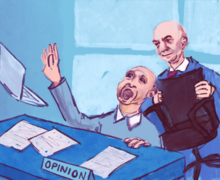Students should take advantage of SU Smart Money program
Cassie Cavallaro | Asst. Illustration Editor
Financial literacy is a vital skill, as it teaches people to save and spend money correctly so they can avoid feeling overwhelmed with their personal finances. Syracuse University is taking appropriate initiatives to educate its students on how to manage their finances.
According to the Teachers Insurance and Annuity Association of America-College Retirement Equities Fund, or TIAA-CREF, those with lower financial literacy “borrow more, have less wealth and end up paying unnecessary fees for financial products. In addition, other consequences of a lack of financial literacy the TIAA-CREF highlights include poor investing, trouble with handling debt — both personal and student — and a lack of knowledge regarding the of their loans and mortgages.
Luckily, Syracuse University has shown a sense of devotion and responsibility to make sure all of its students by the end of their four years have developed strong financial literacy skills. Ranked number two in the nation in the Top 50 College Financial Literacy Programs, the SU Office of Financial Literacy has constantly offered programs to the SU population to expand their arsenal in regards to their financial knowledge and skills.
One of the prominent tools offered by the SU Office of Financial Literacy is the Syracuse Smart Money program, which guides students to “minimize expenses, establish savings, show a commitment to paying off debt and plan for their financial future”. In coordination with this tool, the Office of Financial Literacy also offers consultation with a Smart Money Coach which fortifies the importance of budgeting, managing debt, financial planning and saving with the students.
“Conversations about money and personal finance are often filled with talk of paying off student loans, debt, and paying bills, and savings is often left out of the initial discussion,” said Melissa Marchetti, a Smart Money coach. “Understanding the value of contributing to your 401(k) or retirement fund early-on, saving for future education, or life’s milestones, is extremely important and will not only help students understand the significance of short term saving, but long term investing in your own well-being.”
Even if there are some students who do not want to go through the entire Smart Money Program, the Office of Financial Literacy’s webpage also provides students valuable financial basics.
Yet, with such an amazing program and department available to SU students, there remains a lack of knowledge regarding basic personal finances.
“I don’t even manage my own bank account. Personally, I’ve just always seen personal finances as a topic that I’ll have to be educated on after I graduate from Syracuse and start living on my own,” said Gabi Quintana, a sophomore student at SU.
According to a survey produced by LendEdu of college students from across the United States, 43% of students are not currently tracking their spending. In addition, 30% specified that their parents did not teach them basic financial management skills prior to beginning college.
“Students are often not taught about finances so knowing (the Smart Money Program) is present at SU helps students excel in all aspects,” said Brittany Tavares, another Smart Money coach.
A degree from SU will only bring an individual so far into the real financial world. Without adequate comprehension of financial literacy, one could end up in a state of financial decay where a mismanagement of money has seriously complicated their life. In Northwestern Mutual’s 2018 Planning & Progress Study, 44% of those who responded to the survey found that personal finance is the number one cause of stress among Americans.
To alleviate future stress and financial catastrophe, it is the duty of students and their course instructors, regardless of subject, to acknowledge the necessity of financial literacy.
Syracuse University is preparing its students to be the world’s next critically acclaimed journalists, engineers, musicians, directors, politicians, sports agents and educators. Yet, all of these scholarly and talented students alike will fail to make their mark and be successful in their endeavors if they are not immersed in the basic understanding of financial literacy.
Published on March 1, 2020 at 11:04 pm





